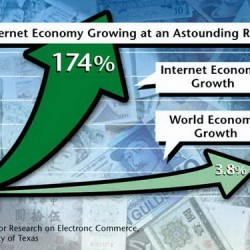Things Can Only Get Better: The Internet Will Save The Economy
 QUITE rightly, there’s doom and gloom about the short term prospects for the economy. However, in the long term there’s blue skies, optimism and unicorns pooping rainbows. The reason is this:
QUITE rightly, there’s doom and gloom about the short term prospects for the economy. However, in the long term there’s blue skies, optimism and unicorns pooping rainbows. The reason is this:
The second factor is the nature of the latest great technological leap by mankind, namely the internet. My suspicion has long been that although its initial benefits were over-hyped, its real contribution will only be seen in the spread and development of the next technological advance.
For the internet is a knowledge storage, retrieval, dissemination and discovery machine. Its effect should be to speed up technological progress.
In the long term the only real determinant of per capita economic growth is how fast is technology advancing? How much more value can we add to the resources we have at our command is another way of putting the same point.
I won’t bore you with the sordid details of what my day job is (think weird, weird metals) but back 15 years when I started finding out who produced what, how and where, who used what, how and where, was the sort of thing that took years of dedicated research. Now you can find out with a few well placed Google inquiries. As in fact I have been, this combination of information at fingertips, email and Skype has enabled me to scope out a German mine as a potential source of one of my weird metals in the course of a couple of weeks. As opposed to the months to years it might have taken before.
This is an advance in productivity brought about by these new tools. It doesn’t show up in any economics statistics as yet: but it will do in the decades to come. This metal I’m on the hunt for is to be used in windmill blades, enabling them to work at higher windspeeds: thus meaning that windmills themselves become more efficient. That it was easier for me to evaluate a source won’t, as I say, ever turn up in any statistics. But it is an advance in productivity which will bring more efficient energy production that little bit closer and that will, in time, show up in higher living standards for all.
None of this is new as an idea either. I think we’d all agree that the 1930s were fairly dispiriting times for those who had to live through them. Yet it was also the time when the mechanisation of agriculture, the arrival of proper mass manufacturing and the use of electricity as a power source led to the biggest productivity gains of any decade we’ve known in human history.
In fact, that’s part of why the times were so bloody: we were rather thrashing around trying to work out how to make use of all of this rise in productivity. As then, so now: the short term isn’t all that lovely to be sure, but the pace of technological change is increasing pointing the way to an ever richer future.
Posted: 30th, August 2011 | In: Money Comment | TrackBack | Permalink


